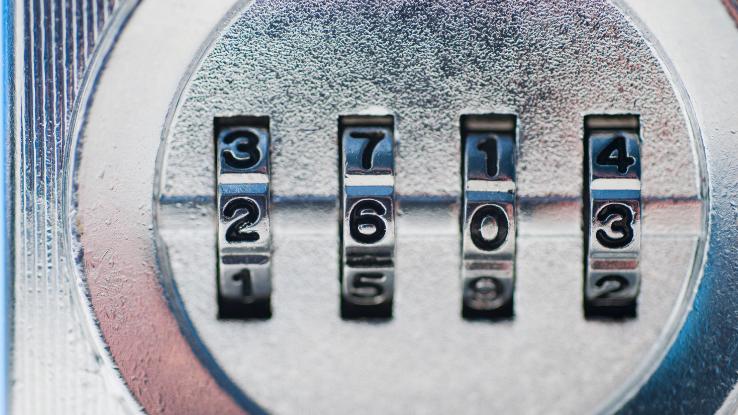How Many Combinations Can Be Made With Four Numbers?

There are 10,000 combinations of four numbers when numbers are used multiple times in a combination. And there are 5,040 combinations of four numbers when numbers are used only once.
How so? Well, there are 10 choices, zero through nine, for each number in the combination. Because there are four numbers in the combination, the total number of possible combinations is 10 choices for each of the four numbers. That is, the number of possible combinations is 10*10*10*10 or 10^4, which is equal to 10,000.
The binomial coefficient formula is a general way to calculate the number of combinations. Here, the number of combinations of k elements from a set with n elements is n!/(k!*(n-k)!), in which the exclamation mark indicates a factorial. Need to go more in depth? We’ve got you covered.
Number of Combinations Formula
Finding the number of combinations that can be made with four numbers can be found through a simple equation. Think of each number as a person and each place in the combination as a seat. There can only be one person in each seat, and there are only 10 people that can sit in a seat. (There are 10 numbers because single-digit numbers go from 0-9.)

In any given combination, any one of the 10 numbers can take any of the four seats. For the first seat, there are 10 options in any given combination. Moreover, for the second seat, there are 10 options in any given combination. The same also applies to the third and fourth seats. To find the total options for all of the combinations, multiply the number of options for the first seat by the number of options for the second seat by the number of options for the third seat by the number of options for the fourth seat.
In other words, you need to multiply 10 x 10 x 10 x 10. In the end, you’ll find that there are 10,000 possible combinations of four numbers.
Number of Combinations Formulas for When Numbers Don’t Repeat
If you say that there are 10,000 possible combinations with four numbers, you would be both right and wrong. That is, the 10,000 answer accounts for allowing any of the 10 numbers to sit in any of the four seats. Following this theory, one of the 10,000 combinations could be 1111, 0000, 2222, or 3333. Let’s throw a wrench into the equation.

In the real world, four-digit combinations often do not have repeating numbers. In fact, many companies do not allow people to set four-digit passwords that repeat the same number over and over. So, how many possible four-digit number combinations are there where numbers don’t repeat?
Forget the seats for a moment and turn to a handy-dandy mathematical formula called the binomial coefficient formula. The formula is as follows:
- n!/(k! x (n-k)!)
In case you didn’t know, each exclamation point represents a factorial. Although both the name and the formula look complicated, it’s actually much easier in practice. Turns out, the concept of people in seats will be helpful for this one too. “K” stands for the number of people that can sit in any one of the seats, and “n” stands for the number of seats any of those people can sit in.
In the case of trying to figure out the number of combinations of four numbers, k=10 and n=4. The equation looks like this:
- 4!/(10! x (4-10)!)
Without going into factorials, that breaks down to:
- 10 x 9 x 8 x 7 = 5,040
Do you notice a trend here? In the first seat, any one of the 10 numbers can sit down. Now, there are only nine numbers left to sit in the second seat. With one more down, there are only eight more that can sit in the third seat, and finally, there are only seven numbers who could possibly sit in the fourth seat.
See? The binomial coefficient is a whole lot simpler than it looks. With the binomial coefficient, any number that’s chosen for one seat is removed from the running for the other seats. Roughly, this halves the total number of combinations.
What This Says About Your Smartphone Password
Let’s be honest. Unless you’re really, really into numbers, you probably didn’t search just to find out the number of possible combinations of four digits. In reality, you’ve probably found your way to this corner of the internet because you’re trying to set a four-digit password. And it’s very commendable that you’re giving thought to your passcode.

Four-digit passwords can seem pretty simple since they are some of the shortest passwords you’re likely to use. However, they also tend to be some of the most important. You may use four-digit number combinations to open your phone or to log in to certain apps more quickly, but where else do you use four number combinations? Most banks ask customers to select a four-digit PIN in order to authorize transactions and use ATMs.
Hackers take advantage of the fact that four-digit number combinations are used as passwords for things you probably care a lot less about protecting than your bank card PIN. People are not nearly as inventive as they should be when it comes to passwords. If someone can crack the code on your lock screen, it’s likely that they can also authorize a transaction on your debit card — after all, there’s a terribly high possibility that those numbers will be the same.
Banks don’t help the problem either. Oftentimes, people have 10,000 choices when it comes to PINs because many banks will allow for repeating numbers. If your bank is a little more security savvy, you’ll only have 5,040 combinations to choose from. Many people use four-digit combinations that are either repetitive or in sequential order. For example, 1234 is a very common choice, and other people combine the same number over and over, such as 1111 or 2222.
Don’t let your knowledge of the binomial coefficient go to waste. There are literally thousands of combinations of four numbers that you could choose from. Do not just pick your birth year or your birth date. For the love of all that is good, please don’t pick 1234 either. If you want to keep a certain someone’s prying eyes out of your smartphone, you’re going to have to try way harder than that. Choose your passwords wisely and keep your identity (and information) safe.





